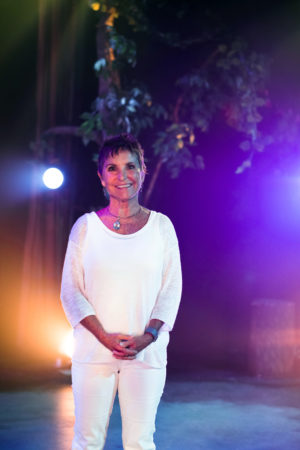The artistic director and founder of kidsActing casts a light on the lessons she’s learned from teaching theater for 37 years.
By Amanda Pinney, Photo by Stef Atkinson
 Dede Clark could never get enough of the blinding stage lights and rolling cameras. After receiving her bachelor’s degree in theater education from the University of Kansas, Clark worked in theater in New York City before completing her master’s degree in film at the University of Texas.
Dede Clark could never get enough of the blinding stage lights and rolling cameras. After receiving her bachelor’s degree in theater education from the University of Kansas, Clark worked in theater in New York City before completing her master’s degree in film at the University of Texas.
Clark realized she wanted to bring her love of theater and acting to children of all ages and talent levels, and in 1980, she founded kidsActing in Austin.
With a host of programs suitable for all acting levels, ranging from young beginners to advanced performers, the studio features everything from summer camps and musical-theater classes to audition workshops and full-scale productions. The emphasis at kidsActing is on making the kids feel welcome by providing an inclusive environment for everyone.
To commemorate her 37 years spent working as a theater teacher, Clark reflects on the top five lessons she’s learned from being a mentor for kids, whether it was in front of or behind the curtain.
Her Lessons:
1. Cherish each individual. “You have to cherish each child for who they are and whatever they bring to the table. They don’t have to be a certain type of person to be successful, to have their lives enriched, to give to the community. It’s about letting each person be safe in discovering who they really are. This is a safe place for that. We have kids in shows that range from being really timid to wildly outgoing. We have kids with a various range of disabilities that we teach. We have kids on every gender spectrum. And it’s all good. It’s all wonderful because that’s who they are.”
2. There’s a solution to every problem. “Screaming at people doesn’t get you anywhere. Everything can be handled, and when you work in this business, you know that stuff happens. It just happens. You always have to be able to go, ‘OK, how are we going to solve this?’ It also translates into life. Instead of worrying about something, you just say, ‘OK, all right.’ When you work with kids, having the ability to not freak out is really valuable because they are mirrors. If you’re tense and crazy, then they’re going to be tense and crazy, and then everybody gets crazy. Ultimately, it all works out in the end.”
3. Everybody bonds without a cellphone. “I have a rule that when [the kids]walk in the door, they put their cellphones in a basket. They power them off and put them in a basket. My attitude is simply that you’re here, there’s a community engagement, there’s creativity, we’re going to build something together. If you’re texting, you’re not building anything but your thumb muscles. What happens is everybody bonds so much more because there is real interaction. When we first started doing it, I had parents that said, ‘My kid can’t be without their phone,’ and I said, ‘Oh yeah, they can.’ I haven’t lost one yet. I’ve been doing this for 37 years, and I haven’t lost a kid yet.”
4. Hard work pays off. “That’s all there is to it. Theater is about that. It’s about responsibility, teamwork, creativity, hard work—all of that in one. The kids thrive on hard work. They’d rather be here than other places. So, the long hours are not a problem because everybody is working toward the same goal and everybody wants the best show possible. They love what they’re doing, so they’re engaged. I think the value of hard work paying off comes from the value of discipline in doing something that you love. These kids are doing [theater]because they thrive and they love it.”
5. Be kind. “It’s really important to me that all the kids treat each other with respect and kindness. Sometimes you get a young kid who’s very successful, gets a lead [role]and all of a sudden, they start to cop an attitude. Well, we nip that in the bud really fast. One of the things we do here is I triple cast all my advanced shows so, for example, there will be three Belles in Beauty and the Beast. When they’re not playing the lead, they play a chorus part. I call it my diva-prevention plan, and it works. What happens that is beautiful is instead of the kids wanting to be better than one another, I see kids work together. We want them all to really get that they’re a team, that if one sinks, they all sink. If they all float, then it’s great.”


